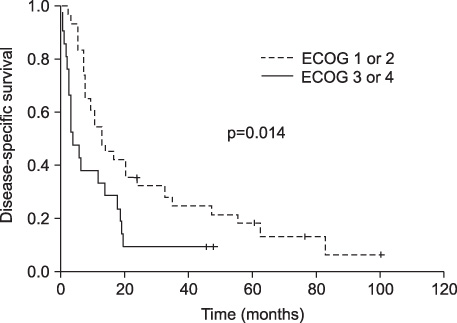Korean J Urol.
2009 Dec;50(12):1174-1181.
Analysis of Clinical Features of Patients with Metastatic Spinal Cord Compression Caused by Prostate Cancer
- Affiliations
-
- 1Department of Urology, Asan Medical Center, University of Ulsan College of Medicine, Seoul, Korea. cskim@amc.seoul.kr
Abstract
- PURPOSE
The purpose of this study was to investigate the clinical presentation and outcomes of metastatic spinal cord compression (MSCC) caused by prostate cancer (PCa) and to determine the prognostic factors for relieving the symptoms of MSCC.
MATERIALS AND METHODS
A total of 52 patients (47 who underwent radiotherapy and 5 who underwent surgery) treated between 1989 and 2007 were included. We investigated potential prognostic factors for the improvement of symptoms caused by MSCC. Multivariate Cox proportional hazards regression was used to determine the independent significant factors for disease-specific survival (DSS).
RESULTS
Twenty-four (51.1%) of 47 patients and 3 (60%) of 5 patients showed symptom improvement after radiotherapy or surgery, respectively. The number of involved vertebrae (1 or 2) as well as ambulatory and Eastern Cooperative Oncology Group performance status (ECOG PS, 1 or 2) before radiotherapy or surgery were significant predictors of improvement of symptoms caused by MSCC (p=0.024, p=0.001, and p=0.001, respectively). In the multivariate analysis, hemoglobin (> or =11.1), the number of involved vertebrae (1 or 2), and ECOG PS (1 or 2) remained significant predictors (p=0.021, p=0.033, and p=0.034, respectively). On the Kaplan-Meier curve, however, only ECOG PS (1 or 2) was a significant factor predicting DSS (p=0.014).
CONCLUSIONS
In our study, improvement of symptoms after treatment was observed in half of the MSCC patients; however, there were no factors predicting symptom improvement other than the number of involved vertebrae and the patients' ambulatory and performance status at the time of treatment. Patients with ECOG PS 1 or 2 may therefore be expected to have good DSS after radiotherapy or surgery.
MeSH Terms
Figure
Reference
-
1. Tazi H, Manunta A, Rodriguez A, Patard JJ, Lobel B, Guille F. Spinal cord compression in metastatic prostate cancer. Eur Urol. 2003. 44:527–532.2. Berruti A, Dogliotti L, Bitosi R, Fasolis G, Gorzegno G, Bellina M, et al. Incidence of skeletal complications in patients with bone metastatic prostate cancer and hormone refractory disease: predictive role of bone resorption and formation markers evaluated at baseline. J Urol. 2000. 164:1248–1253.3. Maranzano E, Latini P. Effectiveness of radiation therapy without surgery in metastatic spinal cord compression: final results from a prospective trial. Int J Radiat Oncol Biol Phys. 1995. 32:959–967.4. Sorensen S, Borgesen SE, Rohde K, Rasmusson B, Bach F, Boge-Rasmussen T, et al. Metastatic epidural spinal cord compression. Results of treatment and survival. Cancer. 1990. 65:1502–1508.5. Hoskin PJ, Grover A, Bhana R. Metastatic spinal cord compression: radiotherapy outcome and dose fractionation. Radiother Oncol. 2003. 68:175–180.6. Rades D, Stalpers LJ, Veninga T, Rudat V, Schulte R, Hoskin PJ. Evaluation of functional outcome and local control after radiotherapy for metastatic spinal cord compression in patients with prostate cancer. J Urol. 2006. 175:552–556.7. Rades D, Heidenreich F, Karstens JH. Final results of a prospective study of the prognostic value of the time to develop motor deficits before irradiation in metastatic spinal cord compressi on. Int J Radiat Oncol Biol Phys. 2002. 53:975–979.8. Jeon SS, Choi HY, Chai SE. Can PSA density and parameters derived from biopsy specimens predict bone scan evidence of metastases in newly diagnosed prostate cancer? Korean J Urol. 2000. 41:925–932.9. Kim KH, Seo YJ, Lee KS. The factors affecting prognosis in patients with metastatic prostate cancer after hormonal therapy. Korean J Urol. 2004. 45:24–28.10. Saad F, Clarke N, Colombel M. Natural history and treatment of bone complications in prostate cancer. Eur Urol. 2006. 49:429–440.11. Lee HM, Chung JK, Lee SE, Kim YK. The value of bone scan for detection of bone metastasis of prostatic cancer. Korean J Urol. 1987. 28:13–17.12. Maurer T, Retz M, Gschwend JE. Palliative and supportive treatment options in patients with advanced prostate cancer. Urologe A. 2007. 46:30–35.13. Fürstenberg CH, Wiedenhöfer B, Gerner HJ, Putz C. The effect of early surgical treatment on recovery in patients with metastatic compression of the spinal cord. J Bone Joint Surg Br. 2009. 91:240–244.14. Chaichana KL, Woodworth GF, Sciubba DM, McGirt MJ, Witham TJ, Bydon A, et al. Predictors of ambulatory function after decompressive surgery for metastatic epidural spinal cord compression. Neurosurgery. 2008. 62:683–692.15. Rades D, Fehlauer F, Schulte R, Veninga T, Stalpers LJ, Basic H, et al. Prognostic factors for local control and survival after radiotherapy of metastatic spinal cord compression. J Clin Oncol. 2006. 24:3388–3393.16. Venkitaraman R, Barbachano Y, Dearnaley DP, Parker CC, Khoo V, Huddart RA, et al. Outcome of early detection and radiotherapy for occult spinal cord compression. Radiother Oncol. 2007. 85:469–472.17. Venkitaraman R, Sohaib SA, Barbachano Y, Parker CC, Khoo V, Huddart RA, et al. Detection of occult spinal cord compression with magnetic resonance imaging of the spine. Clin Oncol. 2007. 19:528–531.18. Rades D, Hoskin PJ, Karstens JH, Rudat V, Veninga T, Stalpers LJ, et al. Radiotherapy of metastatic spinal cord compression in very elderly patients. Int J Radiat Oncol Biol Phys. 2007. 67:256–263.19. Patchell RA, Tibbs PA, Regine WF, Payne R, Saris S, Kryscio RJ, et al. Direct decompressive surgical resection in the treatment of spinal cord compression caused by metastatic cancer: a randomised trial. Lancet. 2005. 366:643–648.20. Chi JH, Gokaslan Z, McCormick P, Tibbs PA, Kryscio RJ, Patchell RA. Selecting treatment for patients with malignant epidural spinal cord compression-Does age matter?: results from a randomized clinical trial. Spine. 2009. 34:431–435.
- Full Text Links
- Actions
-
Cited
- CITED
-
- Close
- Share
- Similar articles
-
- Spinal cord compression with paraparesis in ovarian cancer patient
- Rapid Progression of Metastatic Clear Cell Carcinoma in Thoracic Spine: A Case Report
- Metastatic Spinal Cord Tumors: Originating from Thyroid
- Intramedullary Metastatic Spinal Cord Tumor: A Case Report
- Spinal Cord Ischemia Secondary to Hypovolemic Shock


